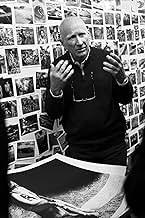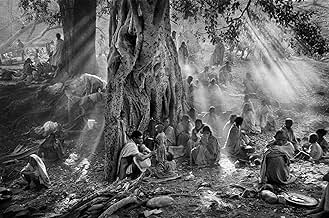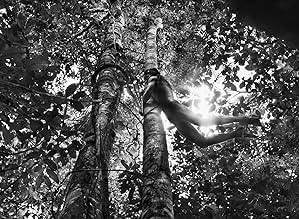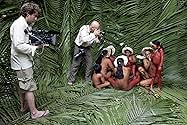IMDb RATING
8.4/10
25K
YOUR RATING
The life and work of photographer Sebastião Salgado, who has spent forty years documenting societies in hidden corners of the world.The life and work of photographer Sebastião Salgado, who has spent forty years documenting societies in hidden corners of the world.The life and work of photographer Sebastião Salgado, who has spent forty years documenting societies in hidden corners of the world.
- Directors
- Writers
- Stars
- Nominated for 1 Oscar
- 14 wins & 15 nominations total
- Directors
- Writers
- All cast & crew
- Production, box office & more at IMDbPro
Featured reviews
Very touching and beautiful doc about life, love, loss, despair, redemption and it shows how, by sheer faith, you can build a forest. Literally. The beautiful photos tell a troubling yet touching story that will make you angry at mankind. By the end you will find yourself believing again and hoping that one day you could be so humble as to reflect on the negative influences in your life and thus be able to change those nativities into positive reactions . You are probably not doing enough for the world around you and when you see how easy it is to make real change, hopefully it will be a call to action. If a picture tells 1000 words, then this film tells 1000 stories.
You completely missed the point of this documentary. I doubt you even watched it till the end. And if you did, you missed the point. Let me make it simple for you. This "photographer" did not just "go" and took a few 'clicks' and selfies, as you make it sound, selling them for wealth. Your review is absolutely appaling. Sebastiao dedicatied his whole life, living among other cultures, documenting their lives. He sacrificed his 'family time' for this. Years of sacrifice. Years of living with the horror of wars, death and famine. He did not see his own children for long periods of time. And let me tell you, his work MATTERS. It's not about the money he made. Is about showing the world the truth about other cultures, about madness and war and lost (and found) paradise. Because in this era, it's easy to deny even the Holocaust! Sebastiao Salgado is a witness of history as it really happened, for a world devoured by fake news. Consider yourself blessed to have watched such a documentary, and pray that if a war will rage across your city, you'll have enough altruism within you to help your neighbour. That's what this documentary is really about. To question yourself of what can you do better, in a desperate situation. It beggs you to be outraged by the destruction humans can bring on this planet. It's not a film about Sebastiao. It's about you. So if you rated it 3, that's the rating you're giving to yourself. Do better.
A fascinating Wim Wenders documentary about Brazilian photographer, Sabastiao Salgado, detailing his life, and varied photographic projects from around the world. Wonderfully filmed, imaginatively edited.
Mainly known as a social photographer, Sabastiao Salgado has documented and revealed the horrors of war, famine and poverty. His travels around the world have accessed hidden brutalities and exposed injustices.
Perhaps as a respite from the human extremes he has witnessed he has recently moved on to projects about the environment. The film features many of his photos and numerous interviews with insights into his personal life.
Mainly known as a social photographer, Sabastiao Salgado has documented and revealed the horrors of war, famine and poverty. His travels around the world have accessed hidden brutalities and exposed injustices.
Perhaps as a respite from the human extremes he has witnessed he has recently moved on to projects about the environment. The film features many of his photos and numerous interviews with insights into his personal life.
THE SALT OF THE EARTH
A documentary on the photographer, Sebastiao Salgado's passion for exposing worlds that are hidden from our view as well as the undercurrents of man's greed, violence and inhumanity - all through what co-director Wim Wenders explains is the process of " drawing with light." The other director is Juliano Ribeiro Salgado, the photographer's son. For many years, I have been beguiled by Salgado's black and white imagery, particularly as source material and inspiration for many of my own late 1980s pastels. His representations are stark and at the same time filled with an expanse of tones - from the deep darkness of coal to the blinding whites which shine with the force of incorporeality; a range of imperceptibly varied grays sandwiched in-between - all breathtakingly beautiful and often reduced to abstract patternings which are in danger of overtaking his subjects, but Salgado is a master at balancing form and content.
I was particularly moved by his photographs of the fierce deprivation that droughts and famine had wreaked on Sub- Saharan Africa - particularly Ethiopia. Because Salgado exposed situations that many people were not aware of, his photos drilled a space for perception into our consciousness. Salgado has traveled to over 100 countries - projects often lasted years and the resulting books include OTHER AMERICAS, WORKERS, SAHEL - THE END OF THE ROAD, MIGRATIONS, Africa, and most recently GENESIS - the book that became his respite after years away from his native environs, witnessing the globe's devastation, including chronicling the genocide in Rawanda and the Congo. By the late 1990's he was heartbroken: "We humans are a terrible animal; we are extremely violent Our history is a history of war; it's an endless story My soul was sick I no longer believed in anything, in any salvation for the human species." (Quotes from Kenneth Turan's review in LA Times.)
THE SALT OF THE EARTH invites us to enter Salgado's personal sphere; we meet his beloved wife Leila, the enduring relationship of his life, the editor of his photographs; the mother of Juliano and Rodrigo - the youngest born with Down syndrome; the compassion and love that unites the entire family in their own personal struggles with domesticity, and the enormous achievement of reclaiming the cattle ranch that was once Salgado's home near the town of Aimores in Brazil's state of Minas Gerais. Memories of the fecund greenery and waterfalls were incised into Sebastiao's childhood recollections and when he returned in the 1990's his homeland was an environmental disaster - dry and parched.
Salgado, his spirit quenched by regarding the pillage, and spoliation around the universe was re-invigorated by Leila's dream of planting a forest in Brazil starting with a few trees and "returning the property to its natural state of subtropical rainforest and in April 1998 they founded the Instituto Terra, an environmental organization which has now been declared a Private Natural Heritage Reserve, some 17,000 acres of deforested and badly eroded land have undergone a remarkable metamorphosis More than four million seedlings native to Brazil's Atlantic Forest have been raised in the institute's own nursery " * This resuscitation propelled Salgado to travel again focusing on the beauties of the planet, resulting in his latest book GENESIS. ( *About us -The Instituto Terra.) http://bit.ly/1JQQzvd
The documentary uses Salgado's majestic photographs interspersing them with site visits to previously unrecorded locations, including old color footage; using his voice and conversations to great effect. We get a sense of the quiet strength of this man, his commitment to justice and the deep suffering that his vision extracts with the lens of a camera. The plethora of interchangeable living beings moving about silhouetted against the background of clouds billowing in the infinite skies, underscore the brevity of time and existence. We are only here for a short interval and Salgado's output is a plea for respect, justice and accommodation among the men/women/animals and the frangible cosmos we all inhabit.
A documentary on the photographer, Sebastiao Salgado's passion for exposing worlds that are hidden from our view as well as the undercurrents of man's greed, violence and inhumanity - all through what co-director Wim Wenders explains is the process of " drawing with light." The other director is Juliano Ribeiro Salgado, the photographer's son. For many years, I have been beguiled by Salgado's black and white imagery, particularly as source material and inspiration for many of my own late 1980s pastels. His representations are stark and at the same time filled with an expanse of tones - from the deep darkness of coal to the blinding whites which shine with the force of incorporeality; a range of imperceptibly varied grays sandwiched in-between - all breathtakingly beautiful and often reduced to abstract patternings which are in danger of overtaking his subjects, but Salgado is a master at balancing form and content.
I was particularly moved by his photographs of the fierce deprivation that droughts and famine had wreaked on Sub- Saharan Africa - particularly Ethiopia. Because Salgado exposed situations that many people were not aware of, his photos drilled a space for perception into our consciousness. Salgado has traveled to over 100 countries - projects often lasted years and the resulting books include OTHER AMERICAS, WORKERS, SAHEL - THE END OF THE ROAD, MIGRATIONS, Africa, and most recently GENESIS - the book that became his respite after years away from his native environs, witnessing the globe's devastation, including chronicling the genocide in Rawanda and the Congo. By the late 1990's he was heartbroken: "We humans are a terrible animal; we are extremely violent Our history is a history of war; it's an endless story My soul was sick I no longer believed in anything, in any salvation for the human species." (Quotes from Kenneth Turan's review in LA Times.)
THE SALT OF THE EARTH invites us to enter Salgado's personal sphere; we meet his beloved wife Leila, the enduring relationship of his life, the editor of his photographs; the mother of Juliano and Rodrigo - the youngest born with Down syndrome; the compassion and love that unites the entire family in their own personal struggles with domesticity, and the enormous achievement of reclaiming the cattle ranch that was once Salgado's home near the town of Aimores in Brazil's state of Minas Gerais. Memories of the fecund greenery and waterfalls were incised into Sebastiao's childhood recollections and when he returned in the 1990's his homeland was an environmental disaster - dry and parched.
Salgado, his spirit quenched by regarding the pillage, and spoliation around the universe was re-invigorated by Leila's dream of planting a forest in Brazil starting with a few trees and "returning the property to its natural state of subtropical rainforest and in April 1998 they founded the Instituto Terra, an environmental organization which has now been declared a Private Natural Heritage Reserve, some 17,000 acres of deforested and badly eroded land have undergone a remarkable metamorphosis More than four million seedlings native to Brazil's Atlantic Forest have been raised in the institute's own nursery " * This resuscitation propelled Salgado to travel again focusing on the beauties of the planet, resulting in his latest book GENESIS. ( *About us -The Instituto Terra.) http://bit.ly/1JQQzvd
The documentary uses Salgado's majestic photographs interspersing them with site visits to previously unrecorded locations, including old color footage; using his voice and conversations to great effect. We get a sense of the quiet strength of this man, his commitment to justice and the deep suffering that his vision extracts with the lens of a camera. The plethora of interchangeable living beings moving about silhouetted against the background of clouds billowing in the infinite skies, underscore the brevity of time and existence. We are only here for a short interval and Salgado's output is a plea for respect, justice and accommodation among the men/women/animals and the frangible cosmos we all inhabit.
1. this is a very good documentary 2. the photographer has a unique eye and drive to travel to impossible places 3. only reason why I am giving it a 9 out of 10 is that I expected more happy moments along with all the starvation/war/struggling miner moments 4. I would still recommend this movie to any creative person who is interested in photography, human history, current events, and personal growth. 5. You will not be disappointed with his frames and photography skills! 6. they include personal moments and love stories to go along with his adventures and photography. 7. my favorite part was the scenes/photography about the Yugoslavian/Bosnian people and their struggles during the war because I used to be good friends with people from that culture back in my refugee days in Germany.
Go check out the movie!
Go check out the movie!
Did you know
- TriviaThe title of the film is a biblical reference, Matthew 5:13: 'You are the salt of the earth. But if the salt loses its saltiness, how can it be made salty again? It is no longer good for anything, except to be thrown out and trampled underfoot.'
- Quotes
Sebastião Salgado - Photographer: We are a ferocious animal. We humans are terrible animals. Our history is a history of wars. It's an endless story, a tale of madness.
- ConnectionsFeatured in The Oscars (2015)
- SoundtracksThe Salt of the Earth
Written by Laurent Petitgand
Performed by Laurent Petitgand
- How long is The Salt of the Earth?Powered by Alexa
Details
- Release date
- Countries of origin
- Official site
- Languages
- Also known as
- La sal de la Tierra
- Filming locations
- Yalimo, Papua, Indonesia(Yali tribe)
- Production companies
- See more company credits at IMDbPro
Box office
- Gross US & Canada
- $1,343,349
- Opening weekend US & Canada
- $44,900
- Mar 29, 2015
- Gross worldwide
- $5,961,567
- Runtime1 hour 50 minutes
- Color
- Sound mix
- Aspect ratio
- 1.85 : 1
Contribute to this page
Suggest an edit or add missing content

![Watch Bande-annonce [OV]](https://m.media-amazon.com/images/M/MV5BMTY0M2ZjMzYtZmJiZC00MDRlLTljNWMtMDRiNmQ1YTgwM2EyXkEyXkFqcGdeQXRyYW5zY29kZS13b3JrZmxvdw@@._V1_QL75_UX500_CR0)


























